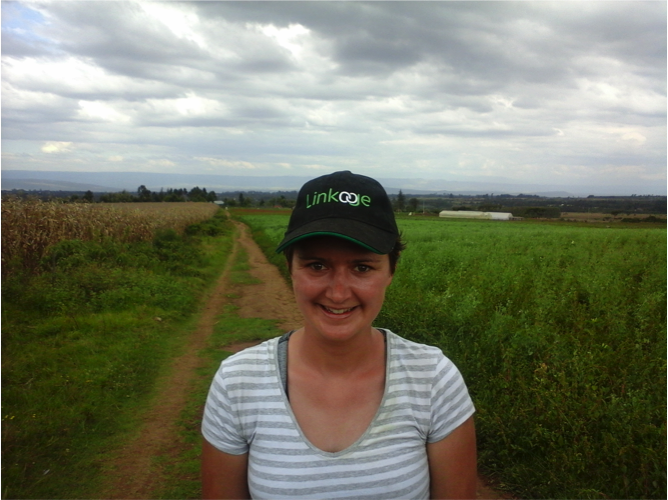Isabella Horrocks found herself in a highly unusual situation. The soft-spoken New Zealander had to explain to her first major investor why her East African startup simply wouldn’t work. Why it would never be profitable. And, painfully, why she and her co-founder husband, James Horrocks, wouldn’t be taking the $60,000 check they were ready to hand over.
Even more surprising, Horrocks credits her MBA education from Oxford University’s Saïd Business School (Class of ’14) with the decision to shut things down. It’s also where the startup began. Horrocks and her husband came up with the idea for Linkage, a vegetable brokerage business for Kenyan farmers, during the Entrepreneurship Project, a mandatory course during the second trimester where students develop a business idea. Instead of dating apps or designer brands, the Horrocks’ business would trade in cabbage, spinach, and kale. Their first clients would be smallholder farmers in Nakuru, Kenya, rather than their peers or easily accessible market research groups.
A MARKET OPPORTUNITY
The idea is not as far-fetched as it sounds. Smallholder farmers in Kenya are regularly shorted by informal brokers, who are also trying to turn a profit in a unpredictable market with slim margins — vegetables are traded by the bike-load and storage facilities are near nonexistent. The risks are high, and farmers bear the brunt of the costs. Linkage aimed to change that. The startup assumed most of the risk and bought farmers’ produce for higher prices. They could do this by scaling up and cutting out inefficiencies. They’d arrange for trades by phone, rather than in person, and have motorbikes pick up the vegetables in bulk, instead of the standard bicycle delivery.
Horrocks had the background to pull it off: After earning a bachelor’s in economics from the University of Canterbury, she joined Komaza, a social enterprise for smallholder farmers in Kenya, as an operations associate. She subsequently moved to Castalia as an analyst where she worked on electrification projects in developing countries for the World Bank. Her husband had a background in investment banking, so he could keep a watchful eye on the Excel spreadsheets to make sure the numbers checked out.
By most startup standards they did. Within the first six months, Linkage had hired seven local employees, built a network of 170 farmers and 20 motorbike drivers, and traded more than 30 tons of vegetables. But this wasn’t just any business looking to sustain itself. The Horrocks were determined to create a social enterprise in the truest sense of the term and that meant they had an obligation to help society too.

Isabella Horrick in Kenya. Courtesy photo
WIRED FOR SOCIAL ENTERPRISE
Horrocks always had a social enterprise bent. “I’m just wired to be interested in the space,” she says. “I’ve never really considered a career outside of it.” After the consulting stint at Castalia, she wanted to get back to making an impact at a grassroots level, build her network, exchange ideas with other like-minded professionals, and, just maybe, start her own social enterprise. The Oxford MBA program jumped out, particularly for its Skoll Center for Entrepreneurship, which attracts social entrepreneurs from all over the world. “As much as its about the content of the course, it’s more about the people who you think you’re going to be rubbing shoulders and bouncing ideas around with,” she says.
She applied only to Oxford. After her husband got a significant scholarship for the same program, they made the jump and enrolled for the September 2013 intake. Horrocks was pleasantly surprised by the interest in Africa among her classmates. She organized an MBA trek to Kenya that exposed participants to a mix of social enterprises and big businesses, including One Acre Fund, Bridge Academies, Living Goods, M-PESA, and Safaricom. Previous treks to the region drew five or six people, Horrocks says. But 23 people signed up for her trip as well as a few partners. “That was a real highlight of my MBA year,” she recalls.
Horrocks would return in Kenya in the summer of 2014 to lay the groundwork for her own business. The Entrepreneurship Project course proved pivotal in getting the idea off the ground, she says. “In terms of useful skills, the Entrepreneurship Project was amazing, really just going through the Lean Startup and really being clear about what assumptions you’re making and how you’re going to test them,” she adds.
Eight Key Challenges of High Impact Entrepreneurs, taught by Skoll Center director Pamela Hartigan and deputy director Daniela Papi-Thorton, was another highlight in Horrocks’ academic experience. The course brought in different social entrepreneurs each week to discuss their experiences. “This wasn’t just business models, it was the raw realities of social entrepreneurship,” she says. The talks inspired her to dig in and get started.
VALIDATION
After mapping out the business plan, Horrocks received the validation she needed to start Linkage when the venture won a £10,000 (roughly $15,000) grant from the Skoll Centre For Social Entrepreneurship. She knew from her previous experience that she also needed local connections. A Kenyan friend in Saïd’s EMBA program owned a large commercial coffee farm and offered to facilitate introductions. That sealed the deal. Linkage was happening. After taking summer electives for two weeks, the husband and wife team went down to Kenya to conduct their research.
They surveyed 170 farmers and found that 97% had mobile phones, 94% used mobile money, and 72% could send a text message. The results validated their hypothesis that conducting trades via cell phone, rather than in person, was a completely feasible — and cheaper — option. “Everyone talks about how connected Kenya is, how everyone has phones … so we thought, ‘Great, we’ll trade vegetables over the phone, save a lot of money in transport, and be able to share that with the farmer,'” Horrocks says.
But, as is so often the case, things aren’t always as they seem. “This was all lovely on paper, but when it came to actually being on the ground and offering farmers a new way to trade vegetables, a lot of the assumptions that we had on our Lean Startup canvas were pretty quickly invalidated,” Horrocks says.
They quickly realized that farmers in rural Kenya may have phones, but many were uncomfortable texting and too embarrassed to admit it. Or they didn’t get reception, couldn’t keep their phone charged, or simply couldn’t read the texts. Linkage tried communicating via voice calls, arranging in-person meetings, and partnering with younger tech-savvy farmers to assist the older generations, but farmers remained hesitant to sign up. Something larger was at play: trust.
‘THE TRUST PIECE IS THE HARDEST’
“In the end, it’s the trust piece that’s the hardest — we had to spend a lot of time building relationships with farmers before they’d trade with us and that meant literally going and harvesting their vegetables, so I spent many hours picking spinach or packing cabbages and having tea with them and meeting their children, but that just blows your cost of customer acquisition out of the water and makes it an unsustainable model,” Horrocks says.
After six months of pivoting and picking veggies, the Horrocks stepped back to assess what it would take scale-wise and time-wise for the numbers to stack up. The results were sobering. They would need 40% market penetration to break even — a miracle in a fragmented market like Kenya. It was a tough call: They had $60,000 in funding lined up, so they could always extend the runway. But Kenya’s vegetable market had a viable alternative — the informal brokers. If they continued, supported by injections of capital, they’d distort the market and put Kenya’s current vegetable traders out of business. They decided to shut Linkage down. “Just because I’m doing good, doesn’t mean I’m not accountable to commercial, operational, and social viability,” Horrocks says.
THE MISSING MARKET SIGNALS
Social enterprises are particularly prone to limping along, supported by the crutch of well-intentioned investors. “In the business sphere, the market is going to send you a pretty strong signal that you’re not viable. Whereas in the social sector, you don’t get that strong market signal. You have funders that will keep it alive, and you have to be so disciplined and really critical of yourself about whether you can actually achieve your goals,” Horrocks says.
She credits her MBA education for the realization that the venture simply wasn’t sustainable. “I think if I had tried to do that without doing an MBA, I would have not been as successful but probably would have done it for longer. I would have floundered around and not been able to say this has failed, our assumptions have been invalidated, and we’re going to walk.”
But that didn’t make Linkage’s flop any easier. Going back to her fellow MBA alumni, friends, and supporters with the decision initially sparked feelings of shame and embarrassment. Now, however, Horrocks looks back on the venture as a key learning experience. “In some ways, we were quite lucky — we got on the ground quickly and started testing quickly. We pushed ourselves to start trading before we were comfortable, before we had things figured out, which was great. Because if we’d sat there brainstorming, we would have come up with a fancy model that would have been completely wrong,” Horrocks says.
STARTING OVER
After closing down the company, Horrocks and her husband moved back to London. He found a job in finance with Google. Horrocks now sits on the other side of the startup table. She joined the Global Innovation Fund as an investment associate where she assesses the viability of social enterprises. All in all, they both rebounded quite quickly from what Horrocks feared would be viewed as a “massive cop out.”
As for the investor? Horrocks was pleasantly surprised when they thanked her for her honestly. She and her husband wrote a report on why Linkage failed and what they learned, which the investor asked to publicize. Horrocks has since gone on to speak publicly about Linkage’s failure and wrote a piece for the Stanford Social Innovation Review about her experience. She wishes failure was talked about more openly during the MBA program. Successful entrepreneurs are invited to speak, but she’d have welcomed hearing from those who knew when to call it quits.
Despite the setbacks, Horrocks hasn’t completely written off the founder role. When asked if she’d attempt another company, she responds: “I would love to one day … I don’t where you get more in of a rush in your life than that.”



